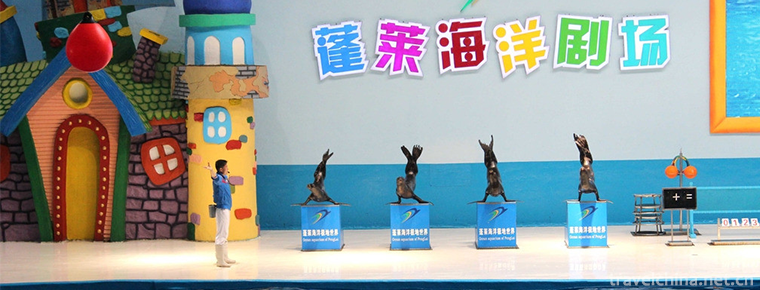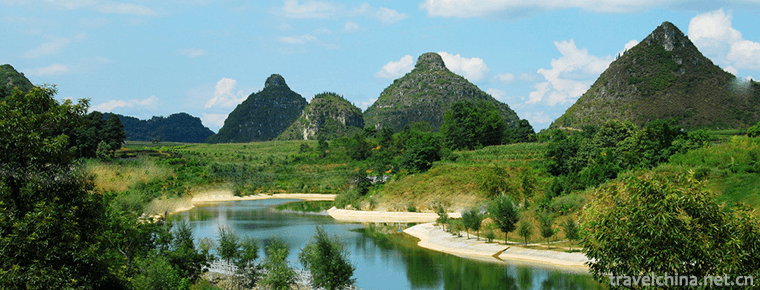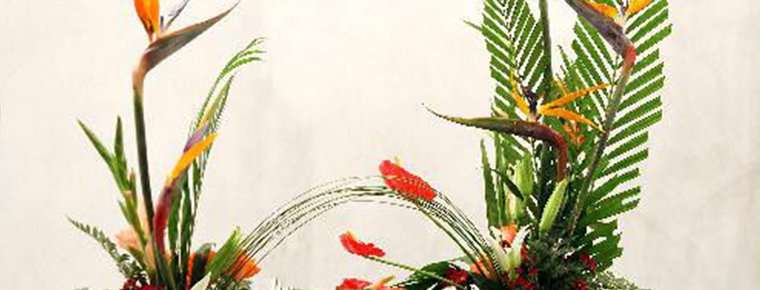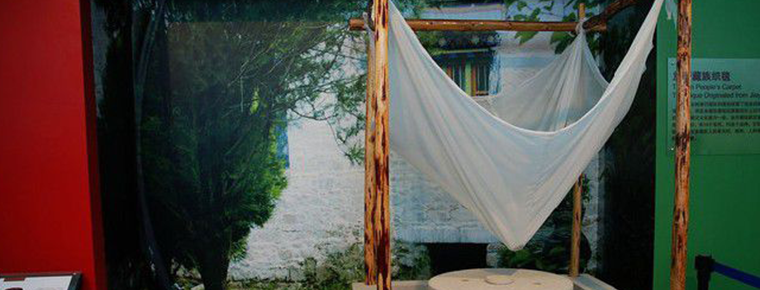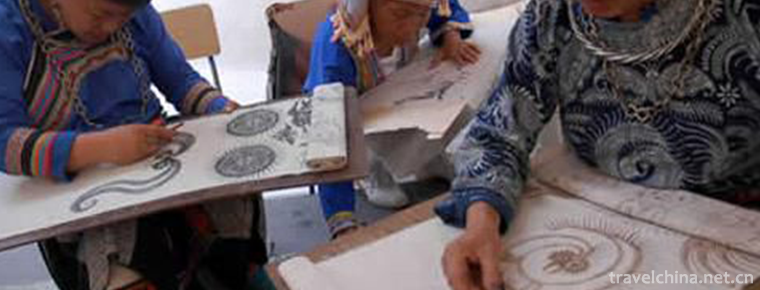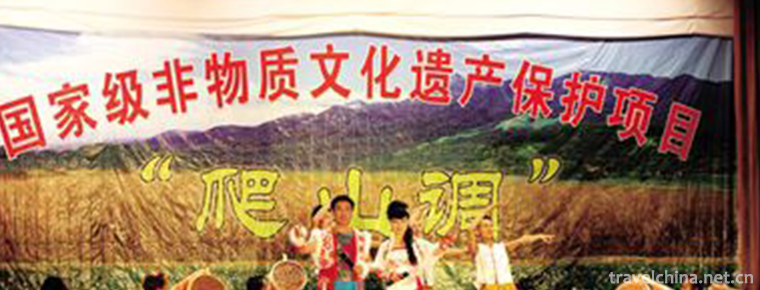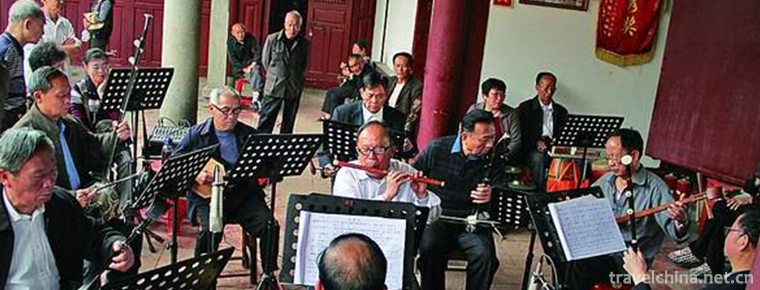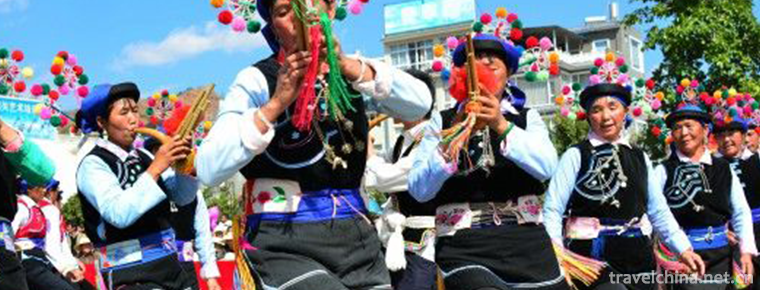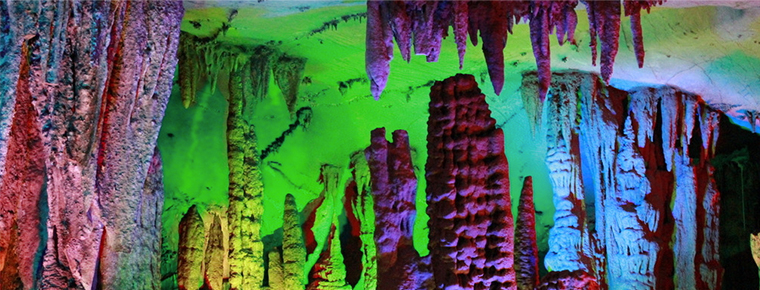Tujia Year
Tujia Year
Tujia Year is an important and ancient festival of Tujia people in Xiangxi Tujia and Miao Autonomous Prefecture of Hunan Province. During the thousands of years of historical development, some relatively fixed and unique customs and habits have been formed and passed down from generation to generation. Although this kind of New Year celebration (Tujia: Nongka) has been called "rushing the New Year" one day ahead of schedule, its custom formed in the long-term historical development process has been preserved to this day. Its rich and colorful content and long duration are also rare in the large families of the Chinese nation.
On May 23, 2011, the Tujia Year declared by Yongshun County of Hunan Province was listed in the third batch of national intangible cultural heritage list with the approval of the State Council.
The Origin of Festivals
The Tujia New Year is the New Year's Day. In the former Qing Dynasty, it was called New Year's Day according to the lunar calendar. After the 1911 Revolution (1911) overthrew the rule of the Qing Dynasty, it was changed from "traveling in the summer calendar, so following the farming season" to "counting from the Western calendar", and the beginning of the first month must be the Spring Festival. Western Hunan folk known as the New Year's Festival for the New Year. The Spring Festival originated from the sacrifice of La in ancient times. "Every grain is ripe for years." The characters "year" in oracle bone inscriptions and bronze inscriptions are both images of fruits harvesting and grain ears ripening. It can be seen that the Spring Festival is not only a time to say goodbye to the old year and usher in the new year, but also a time of harvest. This ancient "Four Starts Festival", which is the beginning of the year, the beginning of the time, the beginning of the day and the beginning of the month, has a special important position and significance in people's minds, and its celebration etiquette is also the most warm and solemn.
The New Year Festival in some Tujia areas of Xiangxi Tujia Autonomous Prefecture in Hunan Province has a special form, forming a unique Tujia year in the region.
In addition to the Tujia New Year on the 29th (or 28th) of December, there are a few areas where the 25th of June of the lunar calendar passes the Year of June and the first of October passes the Year of October. But the only representative is to catch up with the New Year.
Festival activities
New Year's Meat
After the winter solstice, Tujia people (Tujia Dialect: bibkca) will choose a red pig to kill the year pig, which is said to be able to raise pigs next year. The atmosphere of killing pigs in Tujia's inhabited areas is also lively. The butcher's family comes in from that house. The green tree covered village, the flat field in front of the wooden building, became the fiercest battleground between man and pig in the winter months.
When people put a pig in a big barrel, iron it well, fix it, lift it up, hang it on a ladder or put it on the board, and then the butcher will cut the meat into a lump according to its location, divided into pig head (Tujia Language: self expanding), pig leg (Tujia Language: own PAT), pig's butt and block meat. Pig legs are often used to pay New Year's visit to father-in-law's mother-in-law. The owner chopped the pork (Tujia language: self-death) from the pig murderer and gave it to neighbors, relatives and pig murderers to share their hard work and warmth for a year. When killing New Year pigs, the host will invite neighbors, relatives and friends to pick up a meal together, and the invited family will not be polite. In the Tujia people's custom there are "fish eating jumping and pig eating calling", that is to say, the newly killed pigs are more fragrant than other meat. Every Tujia family raises pigs every year. Generally, there are two or three pigs in each household. Most of them also have seven or eight pigs. These pigs, besides selling meat, earn * one or two heads for their own new year's Eve.
Killing pigs is smoked bacon. Bacon smoking process is particularly complex, especially original. First, the pork, mutton or beef, dog meat, first salt, then coated with pepper, pepper, and then placed in a barrel for about ten days, so that the taste of salt, pepper, pepper into the meat. Then they hung one by one over the fire Kang and fumigated it with firewood every day. Once smoked, it lasts several months. There are many kinds of miscellaneous wood in Western Hunan. All kinds of miscellaneous wood contain various nutrients. With the smoking of these nutrients on meat, bacon has a special flavor. Especially the bacon smoked from pine branches, cypress, sandalwood, cinnamon, orange peel, Yugu and other special fragrance materials is more fragrant.
Because of the long smoking time, the bacon in Western Hunan has no water, and will not deteriorate and stink for several years. When eating, burn the skin with fire and wash it with hot water, the color is very beautiful. Fried or steamed, all fat but not greasy, oily and refreshing.
People in Western Hunan also need sausage for New Year's Day. A pig's intestines (Tujia Language: self bound) should be washed with salt for two hours before letting go. Washed the intestines, minced lean meat with a little salt, like spicy people, but also mix a little chili powder. Then pour it into the intestine bit by bit. After filling, hang it on the fire Kang and smoke it like bacon. Smoked sausages can be steamed or fried. Whether steamed or fried, they are truly fragrant!
Push tofu
Tofu (Tujia: drop hi) is a necessary dish for Tujia people in the New Year. Tujia people are mostly in mountainous areas. The abundant and sweet spring water creates special high-quality natural conditions for the tofu made by Tujia people. The tofu made from the mountain spring water has a special sweet taste and endless aftertaste. The process of making tofu is to soak soybeans in mountain spring water at night, filter out the water the next morning, and throw the soybeans into a special pebble mill with a small spoon to grind them bit by bit. After the soybean is milled into soybean milk, it is shaken in the baggage hanging on the big pot on the stove. After the baggage is filtered, the soybean milk enters the pot and is served with a ladle of melon (Tujia people's name for a ladling device) to hold about a liter of cold milk for use. The filtered pulp in the pan is then boiled. In the process of cooking the pot, the gypsum burned in the fire will be ground into powder and put into the cold slurry to be used to stir evenly for reserve. When the pulp in the pot is boiled, it is poured into the barrel and cooled to the surface to form a bean coat. The bean coat is removed in time. Then pour the cold slurry into the gypsum powder along the bottom of the barrel. (No more, no less, no more, no more, no less, no more, little tofu, very bad taste; less, it will be all mesh, can not twist up.) After covering the lid for about five minutes, take a chopstick and insert it vertically into the pulp in the barrel to see if the chopsticks can stand upright in the barrel after they are separated from their hands. If the chopsticks can stand upright (if they can't stand upright, they still need to be covered with a lid for several minutes). It can be poured into the baggage in the tofu box specially used for making tofu, slightly wrapped with the baggage, and then the lid of the wooden box is covered with some heavy things, such as stones. After a few hours, the tofu was made.
The prepared tofu can be fried, boiled and fried, and its taste is particularly delicious. One day before the Spring Festival, Tujia people would fry these tofu into various shapes of oil tofu, such as triangle, rectangle, cube, so that the fried tofu would be very fragrant.
After making tofu, eating a fresh meal and keeping it for cooking oil tofu, people put tofu on the fire and smoke it into dried tofu. Or find a wooden bucket, lay a layer of straw, put a layer of tofu, then lay a layer of straw, then lay a layer of tofu, covered by the fire, let the heat of the fire warm tofu, moldy, moldy tofu. Having mildew, accompanied by pepper powder, pepper powder, ginger shredded, soaked in oil soup for a month, the color of mildew tofu is bright and clean, and the appetite for food is open.
The filtered bean dregs will be disposed of immediately by ordinary people. After eating a fresh meal of bean dregs, the Tujia people would knead the bean dregs into dumplings, put them into a basket and smoke them with bacon. Ten days and a half later, the smoked bean dregs are yellow and fragrant, which Tujia call "eggplant lang". Stir-fried with vegetables is more delicious.
Playing the Ciba
Ciba is the food that Tujia people must prepare during the New Year.
It's a big job to do bamboo bathing. Generally, the neighbors and neighbors come together to fight, or the brothers and brothers come together to fight. Men and women go to battle in an orderly way. There are those responsible for steaming with steamers, burning fires, bamboo bathing, bamboo bathing and bamboo bathing. Generally, the people responsible for bamboo bathing are strong people in several families. Women are mainly responsible for bamboo bathing. There are more people and women who make bamboo sticks, and other procedures usually need only one person to complete.
The Tujia people play glutinous rice, sorghum and millet. The method is to wash glutinous rice, sorghum and millet separately at night, soak them for one night, filter them separately the next morning, steam them separately with steamer, and then, put them in the bamboo trough and knead them with a T-shaped stick and hammer to and fro. When glutinous rice, sorghum and millet are separately beaten out of grains and glutinous rice are glutinous, the man who is making the bamboo stick makes them with stick and hammer. Up, the woman who made the bamboo sticks out her hand which has rubbed the cooked oil and catches it. She puts it on the clean square table together. The handy daughter-in-law twists the glutinous rice sticks into spherical balls of suitable size and distributes them to other bamboo stickers. The people who make the bamboo slices evenly press these small spherical balls under a special wooden board into round cakes. There are generally three sizes. The common bamboo slices, which are often used for food, are about two or three inches in diameter and one centimeter in thickness. The bigger one is about one foot in diameter, and the biggest one needs about three or five kilograms of glutinous rice, or even more than ten kilograms. This kind of bamboo is usually used for wedding celebrations and other festive days. When the bamboo is almost finished, the skillful and skillful women who can make bamboo are called "broken bamboo". It symbolizes the generosity of the Tujia people as well as the "Five Grain Toyota Deng". In addition, there is a legend that the ancestors of the Tujia people in Tian surname had nine brothers and one sister, and their sisters married and more sons-in-law. Because of their powerful power, the emperor feared that they would influence the ruling position of the court by dominating one side, so he sent officers and soldiers to try to kill them. The officers and soldiers came on the 28th day of December when they were playing bamboo batteries. When they saw the fierce officers and soldiers coming, their brothers rushed to divide the bamboo batteries in the trough into several dustpans and carried them up the hill with dustpans. After the officers and soldiers left, several brothers came home with the bamboo sticks that had hardened and could not be separated. When they ate, they only cut them into small pieces with knives and cooked them up. Later, the nine brothers lived on one side and raised their offspring. They did not forget the misery of that year. In order to commemorate the events of that year, they made several such big bamboo sticks for dividing food in New Year's Eve. This custom was inherited by their offspring and gradually became a custom. Later, this kind of bamboo usually stayed until the 15th day of the first month, and some even stayed until the Qingming Festival.
After Baba is made, five stacks of bamboo are placed on the board to cool down. After drying and cooling, they are placed in a clean utensil at home for seven or eight days. Then they are soaked in mountain spring water and replaced with water once every ten days and a half months.
The bamboo batteries made by Tujia people are easy to store, not easy to deteriorate and easy to eat. In Tujia people's life, bamboo batteries have an unusual significance. Spring is a busy season for farmers, so the bamboo is used very well. It is easy, tasty to roast or fry. It can even be brought into the mountains. Some dry wood can be brought in casually, and the bamboo can be set on fire when a pile of fire is set up. Home visitors, after pulling a part of their daily life around the fire pond, can also quickly use the boiling water boiled in the tripod pot on the tripod of the fire pond and boiled with sweet wine and bamboo sticks to entertain guests. During the New Year celebration, bamboo is also useful. In Tujia areas, there are folk proverbs of "New Year's greeting, New Year's greeting and bamboo coming up". The implication is that bamboo is a necessary thing for Tujia people to visit their relatives. Especially when Tujia people pay a New Year's greeting to their son, a pair of bamboo sticks as big as the bright moon symbolizes reunion is indispensable.
Making glutinous rice dumplings
In December, making glutinous rice dumplings is also an important life custom of Tujia people. Tujia rice dumplings are made from glutinous rice. Before making, soak glutinous rice overnight, rub it vigorously to make it white and shiny, then steamed it with a screener, put the steamed glutinous rice in a special round bamboo ring about 20 cm in diameter, put the bamboo ring on a smooth board, and then press the glutinous rice in the round bamboo ring with the help of the power of the palm, so that the thickness of the glutinous rice in the circle is even. The round cake is gently moved to a straw-covered bamboo mat to "iron": under the mat, smokeless mother ash or wool charcoal is smoked until dry. If the weather is fine, it can be dried directly. Some special glutinous rice dumplings are used as gifts. Tujia people also use rice grains dyed red, blue and other colors, carefully arranged into various words, such as red double happiness, happiness, longevity and so on. Some of them use the word "glutinous rice dumplings" to connect them with "grains, clothes, food, spring and gardens". Others use landscape, flowers and birds or lace patterns. After all the decoration is finished, take out the circle and wait for the rice to harden and dry thoroughly, that is to say, it becomes a raw rice dumpling (Tujia language: Ziga). Raw rice dumplings can be chewed slowly or cooked directly, which is more delicious than ordinary glutinous rice. It's best to boil it with purse eggs when needed. It's the best tonic for mothers-in-law. Raw rice dumplings are fried and expanded into ripe rice dumplings (Tujia: Sami). Cooked rice dumplings are crisp, delicious and easy to eat. It can be eaten dry or soaked in boiling water. It is a high-class sacrifice, gift, tea and food for ancestors, gods, guests, relatives and friends. Zongzong is a kind of dry food, which can be stored for months, even years, from the army or migration.
Spring couplet door god
Tujia people generally have the custom of pasting door gods, New Year pictures, couplets and paper-cut patterns during the Spring Festival. The door gods posted by the people of Southern Chu are not the portraits of the gods and men who feed tigers by the two ghosts, namely, Shen Tea and Yu Lei, which are quoted in Jing Chu Sui Shi Ji. Some are the portraits of Qin Qiong and Wei Chigong, famous generals of the Tang Dynasty, and others are the portraits of Guan Yu, Zhang Fei or Zhong Qi and Cheng Biojin. On this important festival, Tujia people posted them on the gates as the guardian gods of exorcising evil spirits in their townships, showing their desire to live a peaceful life.
Paperberry paper
On New Year's Day, every Tujia family will insert cypress branches and plum blossom branches into shrines, pillars and gates, which are related to the war living environment of Tujia ancestors. According to legend, in ancient times, the conscripts had to spend the New Year in Meiyuan Garden outside the village and Pine Berlin because they had to concentrate on celebrating the New Year. Because of the large number of people, there were not so many houses and dining rooms for these conscripts to celebrate the New Year. In order to commemorate the Tujia people's living environment during the war, later generations planted cypress branches and plum blossom branches on the shrines, pillars and gates of the halls during the Spring Festival. Over time, it became a custom of Tujia people to celebrate the Spring Festival. In addition, Tujia people are still on doors and windows, pigsties, cow pens, chicken cages, stone mills and other production tools such as ploughs, rakes, hoes, barrels, etc. on the day of the 29th lunar month, and on the large furniture of their homes, near fruit trees, these places are pasted with lucky money (paper money for offering Bodhisattvas) to herald the prosperity of their wealth in the coming year, which can not be pulled until the 15th day of the first month. Burn out.
At the same time, the Tujia people's ancestor worship is very important, and they still remember their ancestors who have passed away. Sacrifice in front of the shrine before eating New Year's Eve dinner. Most of them are sacrificed at the end of pig's head and pigtail, sacrificing the pig's tail in the pig's mouth to show the whole pig sacrifice. Incense paper and firecrackers were burned during the sacrifice. After sacrificing ancestors, they are sacrificed to gods of doors, land, wealth and so on. The custom of offering sacrifices to the Kitchen King is widespread in Western Hunan both in urban and rural areas, and the Tujia people pay more attention to it. Because the relationship between fire and human is extremely important, it is of inestimable significance in the history of human evolution for human beings to discover and adopt fire. The stove is inseparable from the fire. The sacrifice to the kitchen shows Tujia people's worship of fire from ancient times, and their gratitude to the kitchen king for "cooked food for the people". For this ancient custom, Zongmu of Liang Dynasty in the Southern Dynasty recorded in Jingchu Sui Shi Ji: "On that day, he sacrificed the kitchen god with dolphin wine." The Song Dynasty Fan Cheng Dayun's Ci of Sacrificing Kitchen specifically describes the custom of sacrificing Kitchen in the south of Song Dynasty. Legend has it that on the 24th of December, the Kitchen King will go up to heaven to tell the good and bad of the owner for a year. In order to please the Kitchen King, the owner wipes the head clean and pastes on the new portrait of the Kitchen King and the couplet of "heaven is good, earth is auspicious" and "one master". The sacrifices to the kitchen king before "going to heaven" are more exquisite, and some people even bathe in fasting.
Spring Festival
The people of Western Hunan celebrate the New Year in a hurry. Tujia people celebrate the New Year one day earlier than Han people, that is, the month is bigger than December 29, and the month is smaller than December 28. Tujia people call this way of celebrating the New Year one day earlier than Han people. Happy New Year has its history. Legend has it that during the period of Jiajing in Ming Dynasty, Japanese invaders invaded China and Tujia people were busily preparing for the Spring Festival. Suddenly, the court issued a decree to the Tusi King to mobilize Tujia soldiers to fight against the Japanese invaders along the Southeast coast. According to the itinerary, it was impossible for them to arrive at the designated place on time. In order to let these officers and soldiers who were about to depart immediately pass the Spring Festival. Last year, the Tusi King decided to celebrate the New Year ahead of schedule. When the officers and soldiers and their families were in the regiment year later, the Tusi King took these officers and soldiers to the front line of anti-Japanese war immediately, and arrived at the designated place on time to participate in the anti-Japanese war. Under the leadership of Peng Zhichen and Peng Yinan, the Chief Secretary of the Tusi, the Japanese invaders were defeated in one fell swoop and achieved great victories. The Japanese invaders were expelled and the land was preserved. The emperor of the Ming Dynasty decreed that the emperor should promulgate Zhao and the emperor should grant the plaque to the officers and soldiers of Western Hunan as "the first meritorious service in the southeast". At that time, the Tusi Dynasty in Western Hunan was a clan and clan system. The Tusi King, a Peng surname, took the lead in sending troops, which happened to be on December 24. So Peng's family celebrated the New Year ahead of schedule on December 24. Start after New Year's Day. Tian's family was sent to the army on 25 December, so Tian's family celebrated the Lunar New Year on 25 December. Xiang's surname is on December 26, Qian's surname is on December 27, Li's surname is on December 28, and Wang's surname is on December 29. Every Chinese New Year celebration is different. In order to commemorate the victory of this expedition, and to express the deep memory of the masses against Japanese generals, Tujia people have to advance one day every New Year, that is, December 29. Over time, it has become a custom of Tujia people.
Eat Lunar New Year's Dinner
New Year's Day is a time for family reunion. "Cold dew, frost and precipitation push sand, fish rush to the deep pool and guests rush home." People who go out travel thousands of miles to get home and reunite. The Tujia people in Western Hunan had the Lunar New Year's dinner on this festive day, and firecrackers were fired in both urban and rural areas. The food eaten at New Year's Eve is especially exquisite, which symbolizes auspiciousness.
The Lunar New Year's Festival is the most important ritual for Tujia people. In order to grab the New Year's Day and prepare the Lunar New Year's dinner well, Tujia people often prepare the Lunar New Year's dinner carefully one to two days in advance. The Tujia people have the distinction of having a younger year and having a younger year. The younger year is one day ahead of the younger year. In some places, the younger year is on the 23rd or 24th of December. The annual meals for the younger year are simple and the requirements for the younger year are not too high. The Chinese New Year usually begins at noon. During the Spring Festival, there are differences due to different surnames. Some of them are in the morning, some are at noon, whether in the morning or at noon. It is said that the earlier a family eats New Year's meals during the Spring Festival, the more lucky it will be in the coming year. In the Spring Festival and the Spring Festival, it will be for the good luck of the coming year. A year of intentional rush to set off firecrackers.
When the New Year's meal is finished, we should take the food we eat during the Spring Festival, such as perfume, candles, meat, bamboo sticks and tofu, to honor the eight gods, then to honor the earth gods, the water well gods and other gods of protection, and finally return to the hall to honor our ancestors. Tujia people not only played an important role in history, but also worshipped their ancestors, especially the elders with close blood relationship, as the family gods all the year round. Every hall has a family shrine. On New Year's Day, we should take down the family's first tablets, incense burners and wax tables that have been worshipped in the shrines all the year round and put them on the big tables under the shrines. Family men, led by the elders of the highest generation, burned incense and burned candles and kowtowed in front of the first place in the family. One is to invite the families of past dynasties to have a reunion dinner with their descendants for a happy and lively year, and the other is to pray that the family will bless their descendants with plentiful grain, thriving livestock, prosperous financial resources and family happiness in the coming year. It was not until the fifteenth day of the first lunar month that the family tablet was offered to the shrine.
After putting all kinds of New Year's meals on the table, each person should put a tuft of meat on his own bowl and chopsticks on it. The whole family stood around the table. The elders then burned paper money under the table, scattered three glasses of fine wine on the floor, and invited the ancestors to eat at the table. Then, firecrackers were set off to grab the New Year. Whose firecrackers sounded the earliest at this time would grab the New Year's Day. Cheng.
After respecting all of them, they are seated for dinner according to their ages and seats. Generally, they must give up their superiors to the eldest and eldest people at the time of the New Year's dinner, and wait until the elders have sat down before the younger ones can sit down one after another. For the meals used in the sacrifice, children under the age of twelve are not allowed to eat. Legend has it that they will have poor memory and forget too much, so they must have another meal for the children to eat. Children are not allowed to eat chicken feet. If they eat, they will get poor grades. They can't write well. They write like chicken feet. No more pig tail and pig's fork (pig's hoof), pig tail will be left behind. If you eat a pig's fork, when you grow up to ask your parents, they will fork. Adults and children are not allowed to soak soup, soup will be flooded in the coming year, collapse of the field, the age is not good. Usually, adults should criticize children's leftovers. But the more leftovers children have in their bowls during the Lunar New Year meal, the better. This means that there will be more harvest in the coming year.
The time for eating New Year's meals is generally longer than usual, and the table and dishes can not be cleaned immediately after meals. Legend has it that Tujia people often had to fight with other nationalities in ancient times. It was not peaceful all the year round. One year, when Tujia people were busy preparing New Year's meals, a child came to the Tujia people's village. No one cared about the arrival of the child. Later, it was known that the child came to "explore water" (seek information), because Tujia people neglected the situation in the village was caused by the child. I got it. As soon as the Tujia people finished their New Year's dinner, before they had time to wash dishes and wipe tables, the enemy attacked the Tujia village fiercely. The young and middle-aged had to fight immediately, while the old and the children fled to the cave in the back hill and hid themselves. When the enemy troops were retreated, everyone came back to wipe the tables and wash the dishes. In order to learn lessons, later generations have maintained this habit and passed it down from generation to generation as a custom of Tujia people during the Spring Festival.
Tujia people's New Year's Dinner must be steamed with steamers. The lower layer of steamers is usually steamed with rice. The upper layer is covered with dumped meat wrapped in Millet or rice flour, and the steamer lid is covered with steamer and steamed over the stove. There are many steamers on the day of Lunar New Year's Dinner. Generally, steamers need to be washed on the fifteenth day of the first lunar month. It is also necessary to cook the same dish in the dishes, namely, pork, radish, cabbage, kelp, fans, pig and so on. This dish is called "congratulate dish", which is a homonym for "harmony". It also congratulates the ancestors of Tujia nationality on winning the battle on New Year's day in ancient times. This "greeting dish" everyone must eat it a few mouthfuls, take the whole family happy, everything is in order, do not eat parents will say you do not understand, but parents will not be angry and curse people this day, it is said that one is afraid of offending ancestors, and the other is that there is a sense of bad luck in cursing and being cursed. There is also a history of steaming rice in Tujia steamers. When Tujia officers and soldiers were sent to fight Japanese aggression during the Spring Festival, they had to concentrate on the New Year ahead of time. Because of the large number of people, meat could not be cut into pieces one by one. They had to chop the meat into pieces with axes and knives. Then they steamed some millet on the top of the steamer and cooked it. As for the other dishes, there was no time to fry them separately, so they had to combine all kinds of dishes together. Cooked and eaten. Later, this method was inherited from generation to generation, and gradually became a custom of cooking in Tujia New Year.
Keeping the Year and Seizing the Year
New Year's Eve celebration (Tujia language: Nong A-yi) is one of the most important activities of Tujia New Year's custom. Waiting for the New Year's Eve is the custom of staying up late to welcome the coming of the new year on the last night of the 30th lunar month of the old year (the youngest month is the 29th lunar month). It is also called "staying up for the New Year's Eve". The common name is "staying up for the New Year". On New Year's Eve, when a cock crows at night, firecrackers are set off immediately. There is an interesting story about the origin of this custom among the people.
It is said that in ancient times, there was a ferocious monster named Nian scattered in the deep mountains and dense forests. It was ferocious in appearance, ferocious in nature, specializing in birds and animals, scales and scale insects. It changed its taste one day, from the kowtow beetle to the big living people, and let people talk about the color change of Nian. Later, people slowly grasped that "Year" was a time when people fled to the place where people lived on the 30th night of December every 365 days to taste fresh food. After it was dark, they returned to the mountains and forests when the chickens crowed at dawn. For this reason, people regard this terrible night as a pass, called "Nianguan". Later, Tujia people came up with a whole set of ways to celebrate the Spring Festival. Every night on the 30th night of December, every family had dinner in advance, put out the fire and clean the stove, fasten the chicken pen and cow fence, seal the front and back doors of the house, offer sacrifices to the ancestors and pray for their Gods'protection. Lights are bright inside and outside the hall. Men, women, old and young are sleepless all night. They sit together by the fire pond and chat bravely. They are called "30 Nights Watch". When the "Year" comes, use firecrackers and other things to frighten it away, in order to get the prosperity and auspiciousness of the coming year. Later, the custom of staying up for the New Year's Eve and fighting for the New Year's Eve gradually came into being.
On the night of New Year's Eve, Tujia people will burn fire in the fire pond in order to expel Nian beasts (Tujia language: Midong Dong Wu). It is believed that fire exorcises evil spirits and promotes prosperity. Farmers love to burn big, dry maple trees. On New Year's Eve, a big wood cockroach is burned, which is called "annual fire cockroach". The bigger the annual fire cockroach, the better, and it will last all night. Leave fire for the coming year. Because the bigger the fire, the more signs that the next year will be more prosperous. During the vigil, the whole family sat around the fire and stayed awake all night. (There is another saying: it is said that when the war was fought, the fire was surrounded by a vigil to prevent the enemy from sneaking into the night. Later, in memory, it was imitated every year.) Tujia people will talk about the year, their plans for the coming year, their past, history, anecdotes and family laughter. When a rooster crows, it sets off firecrackers and firecrackers. If a rooster crows at the moment, his family will flourish in the coming year, and he will be lucky. This is the second time for Tujia people to snatch the New Year after having the Lunar New Year dinner. If there is no winner at the Lunar New Year dinner, they will earnestly hold firecrackers, squat in the gate and guard the rooster at the 30th Night of the Lunar New Year. When the cock crows, he immediately sets off firecrackers, and then firecrackers shake the sky in every household of the village. As soon as the cock crows and the firecracker sounds, the Tujia mountain villages are jubilant, scrambling to travel first and pay New Year's greetings to the land Bodhisattva, scrambling to fetch water first, scrambling to grind and bung first, and everywhere is a festival scene full of laughter and joy. When the East turns white, the Tujia people will "travel" to greet the arrival of the New Year with firecrackers. After the firecrackers rang, Tujia Mountain Township was full of the atmosphere of welcoming the New Year. The Festival dress is dressed in body, go door to door to congratulate each other and compose a song about the happiness of Tujia New Year.
Pay New Year call
New Year's greeting is the most important traditional custom of Tujia people. It is a way for Tujia people to say goodbye to the old and welcome the new and express good wishes to each other.
On the first day of the first lunar month, Tujia area in Western Hunan is called the first day of the first lunar year. "Jingchu Sui Shi Ji" cloud: "The first day of the first lunar month is also the day of three yuan. Spring and Autumn is the beginning of the moon. The cock crows and starts, before the court firecrackers, in order to break up the mountain evil spirits. This custom is still widespread in Tujia area of Western Hunan.
On the first day of the first day of the new year, when the chickens crow all over, adults and children get up early, put on their most beautiful clothes and dress neatly so that they can go to celebrate the New Year. New Year's greetings usually start at home. After a child gets up, he should first pay a New Year's greeting to his elders, wishing them good health and longevity, and everything goes well. After the elders accept the New Year's greetings for their children, they should hand over the "New Year's Money" prepared beforehand to the children, especially after the separation of households, the children must first kowtow to their parents-in-law, uncles and uncles (Tujia language: Kata porn). After the elders receive the greetings, they must give the children "New Year's Money" or prepared rice dumplings, melon seeds, peanuts, candies and other fruits, etc., and then the children. Then they went to other families in Tujia village to pay homage to each other. On the way to New Year's Day, the children went to pay homage to each other in groups of three or five. Even those who usually complained would greet each other with a smile on New Year's Day. Before the children go to celebrate the New Year, parents usually tell the children that they will tell the boys to go ahead and the girls to go behind.
When adults go out to meet each other, they should also greet the New Year with a big smile and say "congratulations on making a fortune", "good luck in the four seasons", "good luck" and so on. When they enter any family, they should first say "Happy New Year to you". Then they will say other auspicious words, and the host will take out the things prepared at home and give them to the New Year worshippers to eat.
The most formal New Year's greeting is when young couples go to their parents-in-law's home at the beginning of the first month of the first lunar month. On the back of the woman is a flower and back cage with wine and candy. The man's back is full of Baba, he and a pig leg with a festive red and thick, talking excitedly about "Ga Gong GA Po". Gagong's wife is the name of his grandparents in Western Hunan. After the couple got married and had children, they followed their children and called their parents-in-law their father-in-law and mother-in-law their parents-in-law.
Son-in-law (Tujia language: Ma Taguo) kowtows to his father-in-law and mother-in-law to pay New Year's greetings. He lives at his parents-in-law's house. He can't go out to pay New Year's greetings on the second day of the first lunar month. It is said that going out to pay New Year's greetings is not a good day. After New Year's celebration, people usually go home on the fourth day of the first month, and they can't go home on the eighth day of the first month after sitting at their parents-in-law's house for a long time. There is a saying among Tujia people that "seven don't go out, eight don't return".
New Year's greetings usually begin at relatives'homes and then at friends' homes. New Year's greetings are neat and tidy, and new dresses are worn by new dresses, which is a respect for the host. If you want to celebrate your birthday (birth, marriage, marriage, building a house, congratulations) before entering the door, let off firecrackers to inform you, and the host will set off firecrackers to welcome you. In the old days, it was customary to send a "gift" for visits at large families. A copy of the "gift" was prepared first. The group name, occupation and identity of the visitors were submitted to the family before entering the house, and then they could enter the house with the permission of the owner.
In addition, Tujia area in Western Hunan has the custom of "traveling" to close relatives and friends. The so-called "travel" is the first time to go out for a walk in the New Year. Most "travel" to choose the auspicious day, "travel" once out, if you meet the person in front of you, think the omen is good; if you meet the male omen is better. The people in Tujia area in Western Hunan generally attach importance to "travel" and think that "travel" will break the way of this year. The taboo has been solved, and it is not important to encounter bad things in the future.
If you take a child (Tujia: Zabi Zai) to visit relatives in the first month, you need to bring something to relatives (Tujia: sit on you) when you enter the house. When you return home after a few days of playing at the relatives'home, the relatives will send some money to the children, and say some auspicious words like wishing the children healthy growth.
New Year taboos
Although Tujia people celebrate the festival with joy, they are still pious, serious and vigilant under the control of the concepts of "cautious beginning" and "seeking luck". They are afraid of making mistakes and making taboos, which will affect the whole family's academic, financial and family prosperity.
Tujia people worship their ancestors and superstitious belief in ghosts and gods. In the course of long-term historical development, they have formed some special taboos, which are still followed especially by some elders. There is a saying among Tujia people that "the first month should be taboo, and the last month should be taboo". Since the middle of December, when Tujia people meet, they will say auspicious words to congratulate each other. Before the Spring Festival, disputes with people will be considered extremely unlucky. It will herald "bad luck" in the New Year, especially on the first day of the first lunar month, which is even more taboo. In December, no matter how far apart the Tujia people are, they will not turn their faces. Even those who quarreled and bickered in the past, they will abandon their past suspicions and shake hands to make peace. In December, rice steamed must succeed once when it is baked and cooked. If there are twists and turns in the way, it will be considered unlucky - there will be other disasters for the dead in the coming year. New Year pigs must also be slaughtered with one knife, not with a supplementary knife, otherwise there will be a bad omen. When pushing tofu, you can't see four-eyed people (that is, pregnant people), otherwise disaster will occur in the future. The cow's day in December is regarded as a red shady day, and it is not allowed to go far. There is a saying that "when you go out, you will meet a red shady day, and you will never return home". On the 29th of December, after the steamer was served on the New Year's meal, women could not make needle money, wash clothes, and avoid quarrels with people in their lives. Don't soak soup when eating New Year's meal, for fear of collapse of fields and earth barns in the coming year. You are not allowed to eat Baba on New Year's Day, otherwise you will have long sores on your body. You can't put chili peppers in the dishes, or you will suffer from the loss of chili peppers in the coming year. Children should not eat pig tail when they are having dinner, so as not to shake their heads when they grow up. Do not carry water on the 30th day of December, otherwise you will be considered to touch the Dragon King and cause floods and droughts. No killing, say "sparrows spend 30 nights", so that all kinds of animals can spend the New Year safely and happily, especially in the New Year's day to cook some good things for cattle to feed. On the first day of the first lunar month, avoid words such as "death" (snake), "disease" (drip), "poverty" (Qiqitai), "killing" (moan), "no" (platform), "don't" (Tahong), "back time", "beheading" (expanding Baga) and similar pronunciation, avoid quarrelling, cursing, crying, hurting people and scolding children; avoid injecting and taking medicine; avoid borrowing money to collect debts. Avoid crying and angry; Avoid moving dung and dumping garbage, and so on. For the night watchman who goes to bed, avoid saying "sleep", but say "dig the gold cellar and silver cellar". Avoid sticks, or you will see snakes all the year round. From the first day of the first lunar month to the third day of the first lunar month, no sweeping is allowed, for fear of sweeping away the God of wealth. From the first to the fifteenth day of the first lunar month, adults and children should not shave their heads to prevent seedlings from growing into "shaved heads".
Literary and artistic activities
The literary and artistic folk activities of the Tujia folk Spring Festival are ancient and grand, which add to the joyous atmosphere of the festival. From the first to the fifteenth day of the first lunar month, some places hold annual conventions for 3-7 days. At the beginning of the festival, ancestors are sacrificed to their ancestors, ancestral gods are recorded and the meeting is over. Dragon lanterns, lions, color boats, clamshell lanterns and hand-waving dances are performed, including "Running into the hall", "Commemorating the Eight Parts", "Brothers and Sisters Marriage", "National Migrants" and the original dance "Maogus" in the evening. Wizards wear wind crowns, dresses in Luo skirts, hand-dancing bronze bells and knives, chanting curses on the stage. After reading, the campfire was lit and the young men and women dressed in the same song "wave their hands". During the festival, men and women's Youth Festival contact, can come to find their senior high school people, large-scale "tuning annual meeting" held every few years, one-day start and one-day end, the date is odd, compared with the "big wave" and "small wave", the date is more than three days, smaller scale, mainly waving dance, more than other performance activities. What is more lively is the development of literary and artistic activities such as temple fairs, singing grand operas, playing lions, dragon dancing, riding bamboo horses and so on. Among them, dragon lantern dancing is the most popular. Nearly all the ancestral temple families in urban and rural neighbourhoods, villages and villages have dragons. Folk people think that playing Dragon can protect good luck, so where "dragon" goes, drums and music are singing, firecrackers are endless, and more are given envelope. Married and childless women often let "dragon" turn around their bodies, or let "dragon" gather around in bed and ride a child, known as "Kirin send children".
Tujia folk Spring Festival is another kind of recreational activity - making New Year gongs. Before liberation, almost every village contest had a set of gongs before liberation. After the third day of the first lunar month, gongs could be heard everywhere. Their musical instruments were: a drum, a pair of gongs, one to two-face gongs, several gongs, directed at drum points, usually at four drumbeating points, that is, "drum-claclaclaclang clang clang clang clang clang clang", clang clang clang on the fourth point. When several big gongs were singing, the sound was loud, loud, loud and loud, and loud, the old valleys were stockpiled in the valleys, old valleys and valleys, old valleys, old valleys were stockpiled with gongongs.Customs The two villages confronted each other day and night, and the winner was the one who persisted for a long time, which lasted for half a month.
Inheritance and Protection
On May 18, 2010, the State Council of China announced the list of the third batch of national intangible cultural heritage list recommended projects (new entries). The "Year of Tujia" declared by Yongshun County of Hunan Province was included in the category of folk custom items.

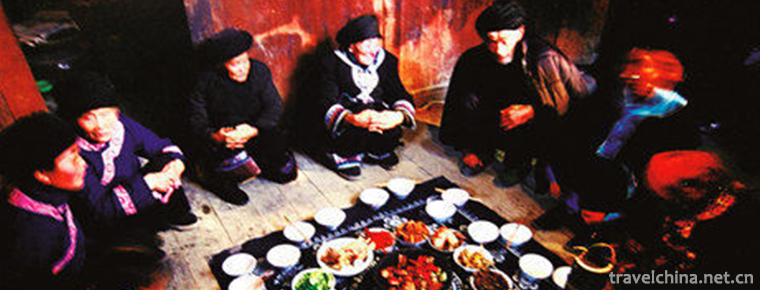
-
Penglai Ocean Polar World
Penglai Ocean Polar World is located at the foot of Penglai Danya Mountain. It is adjacent to the famous Penglai Pavilion. It is invested by Penglai Haifeng Industrial Co., Ltd. for 460 million yuan.
Views: 229 Time 2019-02-07 -
Shuangrufeng Scenic Area
Guizhou Shuangrufeng Scenic Area is located in Zhenfeng County, Guizhou Province. It is 9 kilometers away from the county town and on the main road of Zhenfeng-Guiyang.
Views: 164 Time 2019-02-08 -
Traditional flower arrangement
Chinese traditional flower arrangement art has a long history, extensive and profound, is the representative of Oriental flower arrangement art. It has the characteristics of dignified and elegant mod.
Views: 113 Time 2019-04-19 -
Production Techniques of Lhasa Jiami Water Mill
Jiami Water Mill was built in the 17th century A.D. It shows the outstanding ability of Tibetan people in mechanical manufacturing and grain processing. It makes full use of natural spring water to gr.
Views: 319 Time 2019-05-10 -
Miao Batik Dyeing Techniques
Batik dyeing is one of the ancient folk traditional printing and dyeing techniques of the Chinese nation. As early as the Qin and Han Dynasties, the Miao people had mastered batik dyeing techniques, a.
Views: 381 Time 2019-06-05 -
A tune of mountain climbing
Mountain climbing tune, also known as mountain climbing song and mountain song, is a traditional short-tune folk song popular in the agricultural and semi-agricultural and semi-pastoral areas of centr.
Views: 170 Time 2019-06-08 -
Puxian Ten Sounds and Eight Musics
Puxian Ten-tone Eight Music is not only the traditional folk art folk rap music in Putian area, but also the instrumental music. Ten tones, also known as ten times, are a comprehensive art of instrume.
Views: 152 Time 2019-06-09 -
The Yi Nationality Plays Songs
The dance of the Yi nationality is colorful and varied. It is typical of the simple collective dance "Da Song" (also known as "Ta Song") with the entertainment of the masses. In Mi.
Views: 116 Time 2019-07-12 -
Longtan Karst Cave Scenic Spot
Longtan Karst Cave Scenic Area is located at the foot of longcuban mountain, Miyi Baima Town, Panzhihua City, Sichuan Province, with an altitude of 1500 meters. It is a provincial-level scenic spot and a national AA level tourist area..
Views: 118 Time 2020-10-15 -
Jiufeng Mountain
Jiufeng Mountain is located in Dabao Township, northwest of Pengzhou City, Chengdu City, Sichuan Province. The mountain range extends for more than 200 miles from Northwest Sichuan. From this point, Jiufeng Mountain stands.
Views: 315 Time 2020-11-05 -
Administrative division of Panzhihua
Panzhihua City has 5 county-level administrative divisions (Municipal District 3, county 2) and 49 township level administrative divisions (street 11, town 23, township 15). It covers an area of 7440 square kilometers and has a population of 1.12 million. Panzhihua Municipal People's government is located at No. 2, bingcaogang street, East District..
Views: 318 Time 2020-12-14 -
Topography and geomorphology of Suining
Suining is a hilly and low mountain area in the central part of Sichuan Basin, with simple geological structure and gentle fold. The landform type is single, belonging to the Mesozoic Jurassic strata, which is eroded, cut and accumulated by flowing water.
Views: 113 Time 2020-12-16
